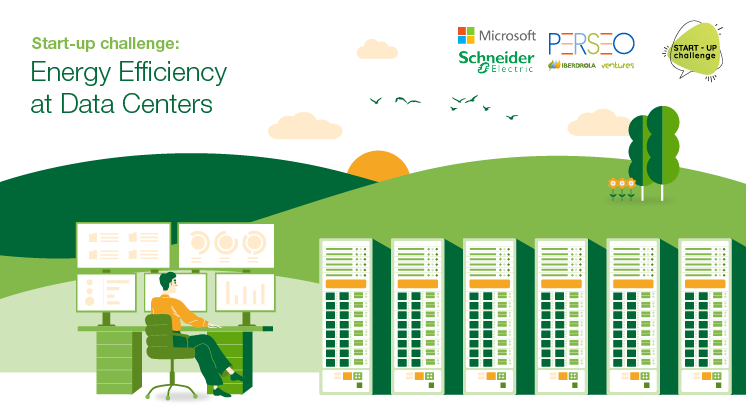Start-up challenge: Energy efficicency in data centers
Tychetools wins challenge to boost energy efficiency in data centres
Start-up challenge Energy efficiency
The technology of the Spanish company Tychetools has been selected by our PERSEO start-up programme, in collaboration with Schneider Electric and Microsoft, as the winner of the Start-up Challenge: Energy Efficiency in Data Centres, which sought innovative solutions to improve the energy efficiency of these facilities.
Iberdrola and Schneider Electric have chosen the Spanish technology company Tychetools as the winner of the Start-up Challenge: Energy Efficiency in Data Centres, in search of solutions to improve the efficiency of energy use in these key facilities. The technology developed by Tychetools seeks to increase efficiency through energy monitoring of the two main consumers inside a data centre: air conditioning and the computer equipment itself.
seeks to increase efficiency through energy monitoring of the two main consumers inside a data centre: air conditioning and the computer equipment itself.
Obtaining this information allows facility owners and managers to optimise their energy consumption - and therefore their environmental impact - without compromising the performance and operation of these critical infrastructures.
The agreement reached by Iberdrola and Schneider Electric with the Madrid-based start-up will focus on analysing the scalability, competitiveness and applicability of its technology in different types of customers and installations, so that it can be an option to be considered among the broad portfolio of solutions that both multinationals offer their customers.
Context of the challenge
Throughout the 21st century, the data centre industry has grown exponentially as a central component of the digital economy. A growth that is expected to accelerate exponentially as cloud computing becomes more widespread as a lever for digital transformation.
These data centres are key to the digitalisation and automation of smart grids, which in turn enable a new interconnected map that responds to the current needs of both energy users and producers. the digitalisation and automation of smart grids, which in turn make possible a new interconnected map that responds to the current needs of both energy users and producers. Their expansion is therefore necessary to achieve the transition to a carbon neutral economy by 2050.
However, data centres represent nowadays a growing source of energy demand, which reaches 200 terawatt hours (TWh) per year (about 1 % of the total global electricity demand). In some places such as Ireland, with a huge density of data centres, this share could be as high as 14 % of electricity consumption.
Cooling in a data centre converts the energy used by the servers and transfers it to an air or liquid stream that transports the heat out of the building, and eventually discharges it into the atmosphere. The willingness to use this hot air poses two challenges: its lower concentration, i.e. the lower temperature of the heat, and the lower temperature of the air, i.e. the low temperature of the waste heat; and the difficulty and cost of transporting it to the end user, i.e. through a district heating system.
Therefore, despite the fact that there are more than 10,000 large data centres around the world, fewer than 100 are involved in heat reuse.
Description of the challenge
In this context, Iberdrola, in collaboration with Schneider Electric and Microsoft, via
These energy efficiency solutions could focus on areas such as:
-
Subchallenge A: Heat and water recovery
Reuse of heat generated by data centres (hot air stream at 32-40 °C) for residential or commercial purposes, or industrial processes. -
Subchallenge B: Smart Buildings
Smart cooperation between different energy management systems (e.g., thermal and electrical). -
Sub-challenge C: Demand Responsiveness
Even for provision of flexibility and balancing services to network operators.
The proposals received, which must specify the equipment and connections needed to implement their solutions, will be analysed by teams of Iberdrola experts, Schneider Electric and Microsoft.
The following value proposals will be positively assessed:
- The maturity, reliability and scalability of the solution
- Simplicity of installation
- The economic impact for data centre managers (cost vs. revenue)
- Improved efficiency of energy use, preferably positive
- Energy Reuse Effectiveness or "ERE", a parameter to quantify the success of heat reuse
- The applicability of the solution for this and other sectors
To understand the context of sub-challenge A on heat recovery, participants may wish to consider the following references:






